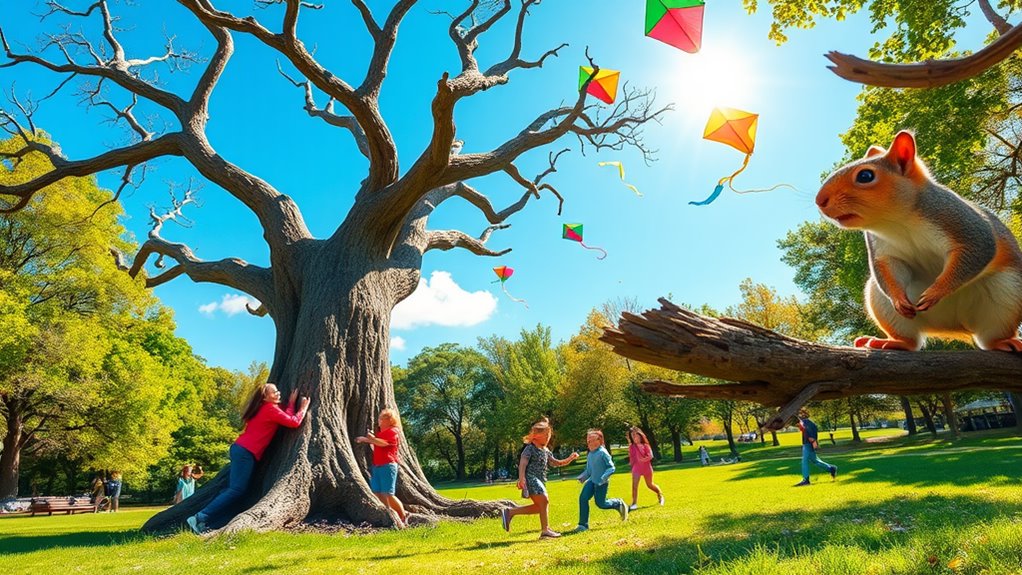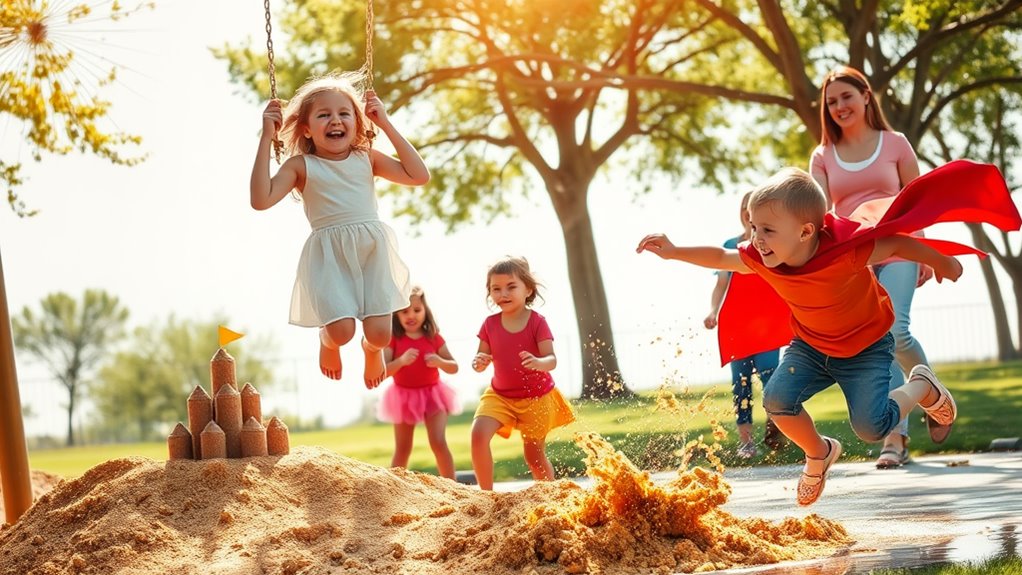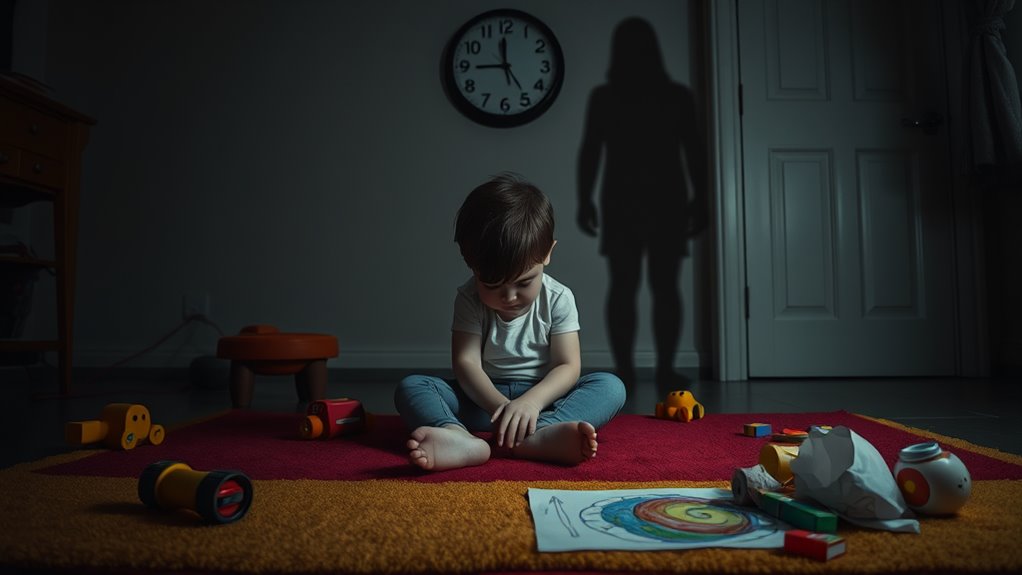The Surprising Benefits of Outdoor Play for Kids
Outdoor play is crucial for your child’s development, offering surprising benefits that go beyond fun. It boosts physical health by enhancing strength and coordination while reducing obesity risks. Socially, it fosters vital skills like teamwork and conflict resolution as kids interact with peers. Creativity thrives through imaginative play and nature-inspired projects. Emotionally, outdoor experiences reduce anxiety and build resilience, helping kids manage their feelings. Plus, it encourages cognitive growth by enhancing problem-solving and navigation skills. These multi-faceted advantages play a significant role in your child’s overall well-being, and there’s so much more to explore about how outdoor play impacts their lives.
Key Takeaways
- Outdoor play strengthens physical health by improving coordination, building muscles, and reducing the risk of obesity through increased activity.
- Engaging with peers outdoors enhances social skills, teaching children negotiation, teamwork, and conflict resolution in a natural setting.
- Creative expression flourishes during outdoor play, allowing children to engage in imaginative role-playing and nature-inspired art projects.
- Nature exposure promotes emotional well-being by providing stress relief, enhancing mood, and fostering resilience through playful challenges.
- Outdoor exploration boosts cognitive development, improving spatial awareness, problem-solving skills, and stimulating creative thinking through unique learning opportunities.
Enhancing Physical Health
Outdoor play is essential for enhancing kids’ physical health. When your child spends time outside, they engage in activities that naturally strengthen muscles and improve coordination. Running, climbing, and jumping not only build strength but also help develop fine motor skills. These activities act as a workout, making their bodies more resilient and agile.
By playing outdoors, kids explore different terrains and surfaces, which challenges their balance and body awareness. This exposure to various physical demands encourages them to adapt and overcome obstacles, fostering confidence in their physical abilities. You’ll notice they become more adept at navigating their environment, whether it’s riding a bike or playing tag with friends.
Additionally, outdoor play encourages your child to be more active, reducing the risk of obesity and related health issues. It’s a natural way for them to expend energy and stay fit.
Building Social Skills
Through engaging in outdoor play, kids develop essential social skills that are crucial for their overall development. When they play outside, they encounter various situations that require them to interact with peers, negotiate rules, and solve problems together. This process not only enhances their communication skills but also helps them learn how to express themselves effectively.
Participating in teamwork exercises, like group games or sports, teaches kids the importance of collaboration. They quickly realize that working together can lead to better outcomes than going solo. These experiences foster a sense of belonging and teach empathy, as they learn to consider others’ feelings and perspectives.
Moreover, outdoor play provides a natural setting for kids to practice conflict resolution. Disagreements are bound to happen, and navigating these situations helps them develop patience and understanding. As they engage with others, they gain valuable insights into social dynamics, which are vital for forming lasting friendships.
Ultimately, the social skills kids acquire through outdoor play lay the foundation for their future interactions. By building these skills in a fun and engaging way, they’re better prepared for the complexities of social relationships as they grow.
Boosting Creativity
Playing outside not only helps kids build social skills but also sparks their creativity. When kids engage in outdoor play, they dive into imaginative exploration that opens their minds to endless possibilities.
Nature serves as a canvas for their creativity, inspiring them to create unique projects and art.
Here are some exciting ways outdoor play boosts kids’ creativity:
-
Imaginative Role-Playing: Kids can transform into superheroes, explorers, or animals, allowing them to think outside the box.
-
Nature Inspired Art: Collecting leaves, rocks, and twigs can lead to fun art projects, encouraging them to express themselves through various mediums.
-
Building and Creating: Whether it’s making a fort from branches or a sandcastle at the beach, the act of constructing gives children the freedom to experiment and innovate.
-
Storytelling Adventures: Outdoor settings stimulate storytelling, where kids can weave tales based on their surroundings, enhancing their narrative skills.
Supporting Emotional Well-Being
While many parents focus on physical activity, outdoor play also plays a crucial role in supporting kids’ emotional well-being. When children engage in free play outdoors, they naturally express their emotions, whether it’s joy, frustration, or excitement. This emotional expression is vital for their development, as it helps them learn to understand and manage their feelings.
Moreover, outdoor play offers essential stress relief. Being in nature allows kids to escape daily pressures and reconnect with their surroundings. The sights, sounds, and fresh air can have a calming effect, reducing anxiety and promoting a sense of peace. Whether they’re climbing trees, chasing friends, or simply lying on the grass, these activities can serve as a natural antidote to stress.
Encouraging your child to spend time outdoors not only enhances their mood but also fosters resilience. It gives them the opportunity to navigate challenges in a playful setting, which can build confidence and coping skills.
Encouraging Cognitive Development
Numerous studies highlight how outdoor play can significantly boost cognitive development in children. When kids explore the great outdoors, they engage their minds in ways that indoor activities often can’t match.
Outdoor environments present unique challenges and opportunities for learning, which can sharpen their problem-solving skills and foster a deeper environmental awareness.
Here are some ways outdoor play encourages cognitive growth:
-
Exploration: Kids learn to navigate their surroundings, which enhances spatial awareness.
-
Social Interaction: Playing with peers helps develop communication skills and teamwork.
-
Creative Thinking: Nature inspires imaginative play, allowing kids to invent games and scenarios.
-
Problem Solving: Facing obstacles outdoors pushes children to think critically and devise solutions.
Fostering Resilience and Independence
Fostering resilience and independence in children often happens through outdoor play, where they encounter challenges that require them to adapt and overcome. When kids climb trees, navigate uneven terrain, or engage in imaginative games, they naturally develop risk-taking strategies. These experiences encourage them to assess their surroundings, weigh potential dangers, and make informed decisions.
As they tackle obstacles, children also enhance their problem-solving skills. Whether it’s figuring out how to cross a stream or constructing a fort with found materials, they learn to think critically and creatively. Each challenge they face outdoors is an opportunity for them to practice perseverance and find solutions, building their confidence along the way.
Moreover, outdoor play fosters a sense of independence. When kids are given the freedom to explore, they learn to trust their instincts, which helps them develop a strong sense of self.
This independence not only contributes to their emotional growth but also prepares them for future challenges in life. So, by encouraging outdoor play, you’re not just providing fun; you’re equipping your children with essential life skills that will serve them well as they grow.
Frequently Asked Questions
How Much Outdoor Playtime Do Kids Need Each Week?
Kids need at least 150 minutes of outdoor exploration each week. Playtime guidelines suggest breaking this into manageable sessions, encouraging regular outdoor activities to enhance their physical and mental development while keeping them engaged and active.
What Types of Outdoor Activities Are Best for Children?
Did you know kids who engage in team sports are 40% more likely to stay active? Activities like soccer and nature exploration, such as hiking or birdwatching, keep them engaged while promoting social skills and creativity.
Can Outdoor Play Help With Academic Performance?
Yes, outdoor play can enhance academic performance. It fosters cognitive development by stimulating creativity and problem-solving skills while promoting physical fitness, which boosts concentration and energy levels, ultimately aiding your child’s learning and school success.
How Can Parents Encourage Outdoor Play for Their Kids?
You might think kids prefer screens, but encouraging outdoor play can spark their imagination. Plan family outings that feature creative play, like scavenger hunts or nature walks, to make outdoor activities exciting and engaging for them.
Are There Any Safety Concerns With Outdoor Play?
When considering outdoor play, you should conduct a risk assessment to identify potential hazards. By prioritizing injury prevention, you can create a safer environment, allowing your kids to enjoy the benefits of outdoor activities confidently.





